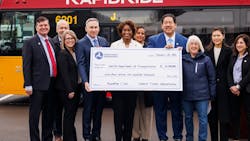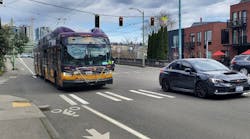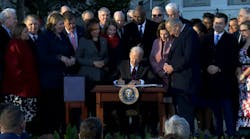FTA awards Seattle DOT $64.2 million for RapidRide J Line BRT
The Federal Transit Administration (FTA) has awarded a $64.2 million construction grant to the Seattle Department of Transportation (SDOT) to support the RapidRide J Line bus rapid transit (BRT) that will provide fast, frequent and reliable service between downtown Seattle, Belltown, South Lake Union, Eastlake and the University of Washington (UW). The grant for the estimated $128.5 million RapidRide J Line was funded by the Infrastructure Investment and Jobs Act and awarded through the Capital Investment Grants (CIG) program.
"Americans depend on fast, affordable and safe transportation options to get to work, pursue their education and come home every day to their families" said U.S. Department of Transportation Secretary Pete Buttigieg. “Bus rapid transit is the fastest-growing transit mode for a good reason and the Biden-Harris administration’s $64.2 million investment will build out Seattle's RapidRide J Line to provide faster, more efficient service that benefits the greater Seattle area.”
SDOT's RapidRide J Line will upgrade an existing King County Metro bus line by providing improved reliability with bus-only lanes and transit signal priority, decreased travel time, protected bike lanes and safer pedestrian access. The 5.2-mile route will have 11 new or improved stations that include shelters, lighting, real-time arrival information and that facilitate all-door boarding. It will also improve rider connections to Link light rail, other bus lines and the Seattle Streetcar. As the route connects downtown Seattle with the University District, it will provide a new transit option to nearly 50,000 students and 21,000 employees, who receive partial or full transit subsidies. The line will travel through Belltown, South Lake Union and Eastlake neighborhoods.
"As Seattle continues to grow, the RapidRide J Line will provide speedy service for commuters, as well as generations of UW Huskies and area residents still to come," said FTA Administrator Nuria Fernandez. "BRT routes have been transforming communities across the country with fast, frequent service along key economic corridors and we are pleased to add Seattle to the growing list of communities benefiting from America’s largest ever investment in high-quality public transportation."
“RapidRide J will make it reliable, safer and more attractive to ride the bus or bike from downtown to the University District, strengthening a regionally significant connection,” said SDOT Director Greg Spotts.
The RapidRide J Line is one of many major transit investments the Levy to Move Seattle is delivering to create a more connected city since being passed by voters in 2016. Other major transit investments include the Madison Street – Rapid Ride G line, which received nearly $60 million in federal funding, the Delridge Way SW – RapidRide H Line and other Transit-Plus Multimodal Corridors throughout Seattle, Wash. The Rapid Ride J line will pass over the newly rebuilt Fairview Ave N Bridge, another key Levy to Move Seattle project which was completed in 2021.
In addition to the CIG funding, the Federal Highway Administration will provide $9.6 million in funding while the Washington State Department of Transportation and UW will each contribute $6 million. The city of Seattle will provide $43 million, mostly from the Levy to Move Seattle. King County Metro is contributing more than $10 million toward station amenities and staff resources.
“Riders and community members consistently tell us that what matters to them is frequent, reliable and safe transit,” said King County Metro General Manager Michelle Allison. “This FTA grant upgrades and delivers RapidRide J Line improvements to serve people better.”
Service is expected to begin on the RapidRide J Line in 2027.

Brandon Lewis | Associate Editor
Brandon Lewis is a recent graduate of Kent State University with a bachelor’s degree in journalism. Lewis is a former freelance editorial assistant at Vehicle Service Pros in Endeavor Business Media’s Vehicle Repair Group. Lewis brings his knowledge of web managing, copyediting and SEO practices to Mass Transit Magazine as an associate editor. He is also a co-host of the Infrastructure Technology Podcast.





